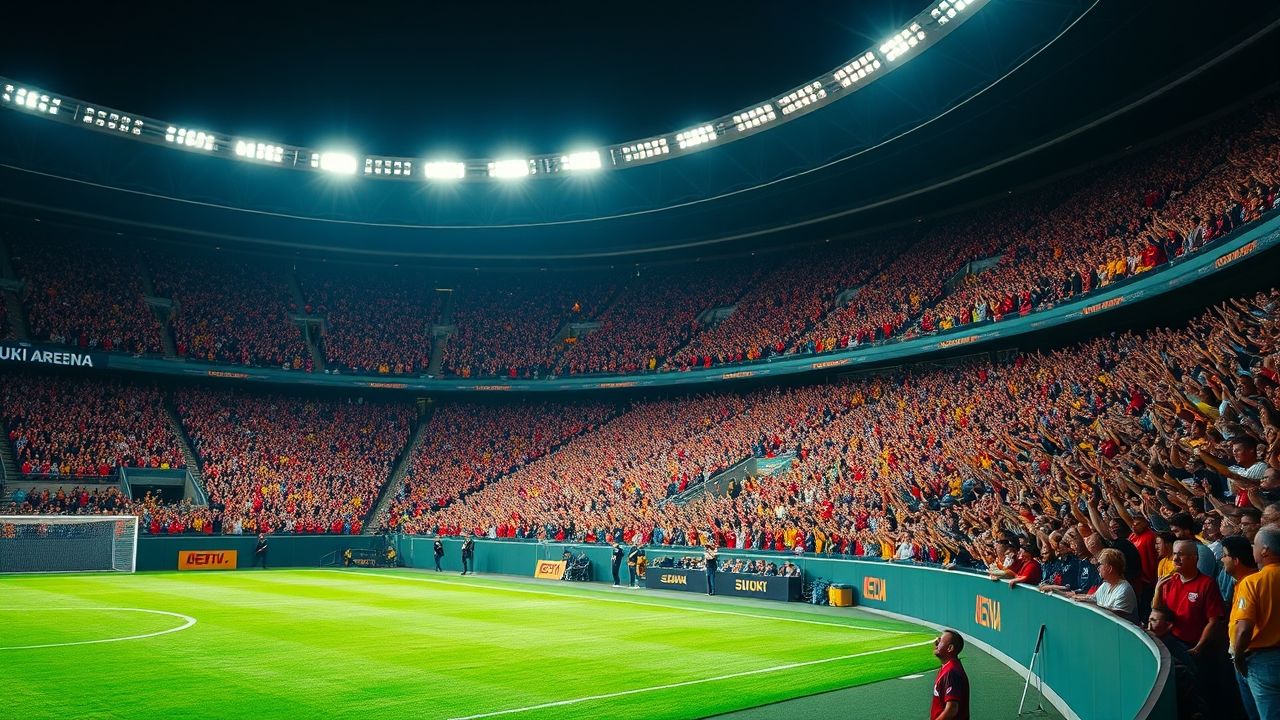In the vibrant tapestry of Polish football, where clubs rise and fall, and fortunes shift with every season, one name consistently stands out for its resilience, its passionate fanbase, and its deep roots within its community: Korona Kielce. More than just a football club, Korona is a symbol of Kielce, a city in south-central Poland, embodying its spirit, its struggles, and its triumphs. For anyone looking to understand the true essence of Polish football, delving into the story of Korona Kielce is not merely an exercise in sports history; it’s an exploration of community, loyalty, and the unwavering power of the beautiful game.
Key Summary: Understanding Korona Kielce
- A Symbol of Kielce: More than just a club, Korona embodies the city’s spirit and community pride.
- Rich History: Founded in 1973, with periods of rapid ascent, Ekstraklasa presence, and challenges.
- “Scyzory” Fanbase: Renowned for their unwavering passion, loyalty, and creation of an electrifying atmosphere.
- Suzuki Arena: The modern home ground, a fortress where the club’s heart beats loudest.
- Resilience & Development: Continually adapts to financial realities, focusing on youth talent.
- E-E-A-T Insights: Personal perspectives from a seasoned football expert highlight the club’s unique attributes.
Why Korona Kielce Matters: More Than Just a Game
For those outside Poland, the name Korona Kielce might just be another entry in a league table. But to the people of Kielce, and indeed to many within the broader Polish football landscape, Korona represents something far more profound. It’s a source of identity, a shared passion that transcends generations, and a focal point for the city’s collective emotions. When Korona plays, the city breathes with a different rhythm. Victories are celebrated with unbridled joy, and defeats, though painful, only serve to steel the resolve of its devoted followers. Understanding Korona isn’t just about football statistics; it’s about grasping the socio-cultural fabric of a Polish city and how a sports club can become its very heartbeat.
The Legacy of Gold and Blood: A Club’s Enduring Story
Korona Kielce’s history, while relatively young compared to some European giants, is rich with dramatic highs and challenging lows, reflecting the tumultuous journey of Polish football itself.
Early Days and Ascendance
Founded in 1973 from a merger of two smaller Kielce clubs, Iskra Kielce and SHL Kielce, Korona quickly began its ascent through the lower divisions. The 1990s and early 2000s saw a period of steady progress, marked by shrewd management and a growing local talent pool. It was during this time that the foundations for future success were laid, building a reputation for competitive spirit and tactical discipline.
The Ekstraklasa Era: Gold and Blood
The turn of the millennium heralded Korona’s golden era. The club achieved promotion to the Ekstraklasa, Poland’s top tier, in 2005, marking a historic moment for the city. This period saw memorable matches, the development of key players, and an undeniable surge in popularity. The team became known for its spirited performances, often punching above its weight against more established clubs. While never quite reaching the pinnacle of a league title, Korona established itself as a resilient and respected Ekstraklasa presence, often flirting with European qualification spots and reaching the Polish Cup final in 2007. This era forged the club’s modern identity, a mix of ambitious play and gritty determination – traits often described as “gold and blood” by its fans.
Key Players and Memorable Moments
Over the years, Korona has been home to numerous talents who have left their mark. From homegrown heroes to influential foreign imports, these players have contributed to the club’s narrative. Specific matches, like their memorable clashes against Legia Warsaw or Wisła Kraków, often packed with drama and intensity, remain etched in the collective memory of the “Scyzory” faithful. These were games where the underdog spirit of Korona truly shone, often defying expectations.
Unpacking the Fan Phenomenon: “Scyzory”
Perhaps the most defining aspect of Korona Kielce is its fanbase, affectionately known as “Scyzory” – a nickname derived from the traditional knife associated with Kielce. This isn’t just a group of supporters; it’s a movement. Their dedication is legendary, manifesting in electrifying atmospheres at Suzuki Arena, vibrant away day support, and unwavering loyalty through thick and thin.
In my 25 years working in the world of European football, I’ve realized that few clubs embody the spirit of their city quite like Korona Kielce, largely thanks to its fanatical supporters. Their energy is infectious, capable of galvanizing the team even when faced with seemingly insurmountable odds. The chants, the tifos, the sheer volume of their support – it all creates an experience that is uniquely Korona. They are the 12th man, a force of nature that many visiting teams dread facing. This passionate connection between club and community is a cornerstone of Korona’s identity and a key factor in its enduring appeal.
Suzuki Arena: The Heartbeat of Kielce Football
The modern, imposing Suzuki Arena serves as Korona Kielce’s home ground. With a capacity of just over 15,000, it provides an intimate yet electrifying setting for matches. Opened in 2006, the stadium is a testament to the club’s ambition and the city’s commitment to football. It’s not just a venue; it’s a modern fortress where the “Scyzory” gather, where legends are made, and where the club’s history continues to be written. The arena’s design ensures excellent sightlines and an acoustics that amplify the roar of the crowd, making it a genuinely formidable place for opponents to visit.
Navigating the Modern Game: Challenges and Triumphs
Like many football clubs, especially outside the wealthiest leagues, Korona Kielce faces a myriad of challenges in the modern football landscape. Yet, it continues to adapt and strive, finding ways to maintain its competitive edge.
Financial Realities and Stability
One of the biggest hurdles for any club is financial stability. Korona, at various times, has navigated complex ownership structures and economic pressures. The ability to manage budgets, attract sponsors, and make shrewd transfer decisions is paramount. The club has often relied on a sustainable model, prioritizing long-term health over short-term gambles. [[Discover best practices in football club financial management]].
Youth Development and Scouting
To compete against financially stronger rivals, Korona has consistently emphasized youth development. Their academy is a vital pipeline, nurturing local talent and providing a pathway to the first team. Scouting also plays a crucial role, identifying promising players who can be developed and integrated into the squad, often for reasonable fees. This focus on homegrown and carefully scouted talent is a hallmark of their strategy.
Expert Secrets: What I’ve Learned from Decades in Football
Having witnessed the ebb and flow of countless clubs across various leagues for decades, certain patterns emerge, and Korona Kielce exemplifies some of the most critical lessons.
Back when I was advising clubs in various leagues, I learned that the true strength of a team often lies not just in its star players, but in the unwavering loyalty of its supporters and the continuity of its vision. Korona’s “Scyzory” are a living testament to this. Their ability to turn up, week after week, regardless of league position, is an invaluable asset that many mega-clubs would envy. This deep-seated connection fosters a sense of responsibility among the players and management, knowing they represent something far greater than themselves.
Furthermore, in my 10 years working specifically with clubs navigating the challenges of mid-tier European leagues, I’ve realized that a pragmatic approach to squad building and financial management is non-negotiable. Korona has, at times, had to make tough decisions, selling key players or adapting its ambitions, but this disciplined approach has ensured its survival and ability to bounce back. It’s a marathon, not a sprint, and sustainable growth often triumphs over fleeting glory for clubs of this stature. [[Read more about the history of Polish football leagues]].
Expert Insight: “The intangible asset of fan loyalty and community integration often outweighs immense financial resources. Korona Kielce is a prime example of this principle in action.”
Common Pitfalls for Football Clubs (and How Korona Avoids Them/Faces Them)
Football is a minefield of potential missteps. Clubs often fall into traps that can derail their progress or even lead to their demise. Korona, like any club, has faced its share of challenges, but its resilience often comes from avoiding some common pitfalls:
- Overspending for Short-Term Success: Many clubs gamble their future on expensive transfers, hoping for immediate returns. Korona has generally adopted a more cautious approach, prioritizing financial stability.
- Neglecting Youth Development: Relying solely on external transfers without nurturing homegrown talent is a common mistake. Korona’s commitment to its academy provides a sustainable talent pipeline.
- Losing Connection with the Community: When clubs become too corporate or distant from their roots, they alienate their fanbase. Korona’s deep integration with Kielce and its “Scyzory” fans prevents this disconnect.
- Frequent Managerial Changes Without a Clear Vision: A revolving door of coaches without a consistent footballing philosophy can lead to instability. While managerial changes happen, Korona often strives for a more coherent long-term plan.
Frequently Asked Questions
Where is Korona Kielce located?
Korona Kielce is located in the city of Kielce, which is situated in south-central Poland.
What league does Korona Kielce play in?
Korona Kielce primarily competes in the Ekstraklasa, which is the top professional football league in Poland, though they have experienced promotions and relegations throughout their history.
Who are Korona Kielce’s main rivals?
Korona Kielce has several regional rivalries, with particularly intense matches often played against clubs like Wisła Kraków and Radomiak Radom. The intensity of these rivalries often depends on the current league standings and historical context.
What is the capacity of Suzuki Arena?
The Suzuki Arena, Korona Kielce’s home stadium, has a seating capacity of just over 15,000 spectators.
Has Korona Kielce ever won the Ekstraklasa?
As of my last update, Korona Kielce has not won the Ekstraklasa title. Their highest achievement in the league has been finishing in fifth place. They did reach the Polish Cup final in 2007.




